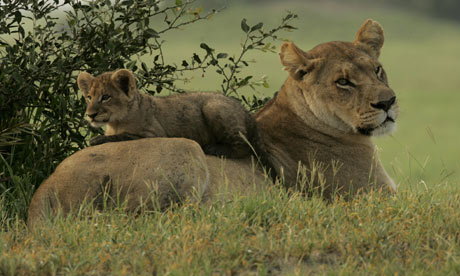African lions – the killer kings in mortal danger from man and sham medicine
http://www.guardian.co.uk/environment/2013/feb/25/lions-africa-endangered-species-medicine-habitat

Female African lion resting with her cub, Okavango Delta, Botswana. Photograph: Beverly Joubert/NGS/Getty Images
In 2002, I spent 10 days in Kenya. I'll never forget lying in a tent on the Maasai Mara trying to sleep against the awful, blood-curdling roar of lions hunting on the moonlit plains. I would wake every hour, swearing a beast was at my door. Seven years later, a trip to Botswana ended without seeing (or hearing) a single lion, and while the safari was magnificent, something powerful and fearsome was notably absent. It made me wonder: what would Africa be without lions?
It's not a rhetorical question. The king of the beasts is on his deathbed. The great cats are vanishing across Africa. In fact, a study last year in Biodiversity Conservation estimated that lion populations have fallen by 68% in just 50 years: from 100,000 in 1960 to 35,000 today. Another report by the NGO LionAid, however, estimated even fewer: 15,000.
While even 15,000 may sound like a lot when compared to other threatened species, lion populations are spread over more than 20 countries, spanning a geographic area larger than south America. Today they survive in small, fragmented pockets. Looking at a map of historic versus current lion ranges is like viewing a continent submerged by rising seas: only scattered islands remain. The situation is most dire in Western and Central Africa where LionAid warns as few as 645 lions survive.
The story of the lion's decline is similar to that of many big predators. Ever-expanding human populations have gobbled up lion habitat for agriculture, livestock, and cities, while numbers lion prey – from antelope to zebra – have fallen dramatically. And like many top predators, lions face an unceasing conflict with humans: they are killed as pests, for trophies, and even for sham medicine. In order to conserve the lion, we must first stop so many dying at human hands.
